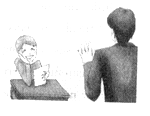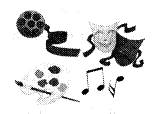
題目列表(包括答案和解析)
| |||||||||||||||||||||||||||||||||||||||||||||||||||||||||||||||||||||||||||||||||||||||||||||||||||||||||||||||||||||||||||||||||||||||||||||||
Students these days often have a lot of worries. Sometimes they have problems with their schoolwork, and sometimes with their friends. Some people think the worst thing is to do nothing. Laura Mills, a teenager from Washington, agrees. "Problems and worries are normal in life," says Laura. "But I think talking to someone helps a lot. If we don't talk to someone, we'll certainly feel worse. "
Laura once lost her purse, and worried for days. She was afraid to tell her parents about it. She even walked three miles to school each day because she didn't have any money. She just kept thinking. "If I tell my parents, they'll be angry! But in the end, she talked to her parents and they were really understanding. Her dad said he sometimes made careless mistakes himself. They got her a new purse and asked her to be more careful. "I will always remember to share my problems in the future!" Laura says.
Robert Hunt advises students about common problems. He feels the same way as Laura. "It is best not to avoid our problems. We should always try to solve them. He thinks that you can first find someone to talk to. This person doesn't need to be an expert (專家) like himself. Students often forget that their parents have more experience than them, and are always there to help them.
In English, we say that sharing a problem is like cutting it in half. So you're halfway to solving a problem if you talk to someone about it!
【小題1】Which of the following can be put in the blank in Paragraph One?
| A.What can they do about this? |
| B.Where do the problems come from? |
| C.When did they have these problems? |
| D.Why do they have so many problems? |
| A.a(chǎn)nswer a question | B.give an example |
| C.introduce his friend | D.share his experience |
| A.Laura's teacher | B.the writer of the passage |
| C.a(chǎn) person with a problem | D.a(chǎn)n expert on students' problems |
| A.Few children are careful with their money. |
| B.Parents are more experienced than children. |
| C.Talking to someone helps to solve problems. |
| D.Students often have a lot of worries at school. |
| A.I had no interest in them |
| B.English idioms were very difficult |
| C.I did not realize the importance of them |
| D.my teacher didn’t tell us the importance of them |
| A.I had talked too much |
| B.I had to stop talking |
| C.he was not interested in the topic |
| D.he was only interested in the Great Wall |
| A.interesting | B.important | C.terrible | D.unlucky |
| A.The Englishman wanted me to act as his guide. |
| B.The Englishman left China without seeing the Great Wall. |
| C.The Englishman wanted to see the Great Wall after I talked about it. |
| D.The Englishman visited the Great Wall and thought it worth visiting. |
| A.I felt very silly |
| B.the Englishman became a real fool |
| C.I became more carefully in everything |
| D.I thought the Englishman had made me a fool |
| A.He doesn’t like learning English. |
| B.He meets trouble with his English teacher. |
| C.He doesn’t know how to get on well with his English teacher. |
| D.He doesn’t like English any longer. |
| A.he doesn’t like his English teacher |
| B.he can’t speak in class |
| C.his English teacher punished(懲罰) him |
| D.his English is poor |
| A.she didn’t like him |
| B.she didn’t think Mike was learning English hard at that time |
| C.Mike was bad at English |
| D.Mike was making much noise |
| A.be even angrier |
| B.a(chǎn)sk him to stand for some time once again |
| C.be pleased |
| D.say sorry to him |
| A.Mike dislikes English classes, but he wants to learn English well. |
| B.Mike wants the editor to tell his English teacher the truth. |
| C.The editor gave Mike some advice, but it didn’t work. |
| D.The teacher hates Mike much more than before. |


| A.looking at a map | B.a(chǎn)sking penple for help |
| C.reading a handbook | D. walking around the school |
| A.try to stand up all the time |
| B.be friendly to the mean persons |
| C.a(chǎn)lways do things by yourself |
| D.not change your idea if it’s right |
| A.how to fit in when at a new school |
| B.how to make friends at a new school |
| C.how to enjoy the beauty of the school |
| D.how to be yourself at a new school |
湖北省互聯(lián)網(wǎng)違法和不良信息舉報平臺 | 網(wǎng)上有害信息舉報專區(qū) | 電信詐騙舉報專區(qū) | 涉歷史虛無主義有害信息舉報專區(qū) | 涉企侵權(quán)舉報專區(qū)
違法和不良信息舉報電話:027-86699610 舉報郵箱:58377363@163.com